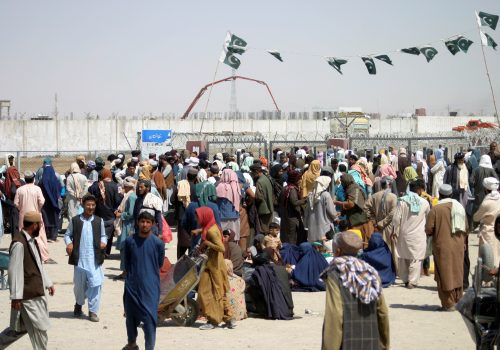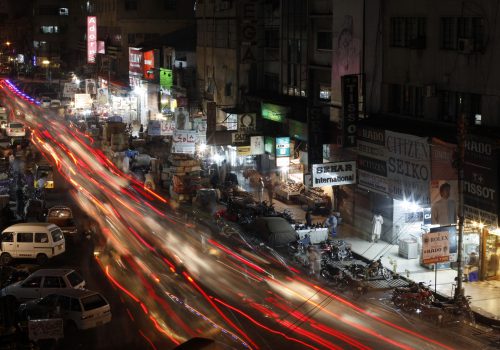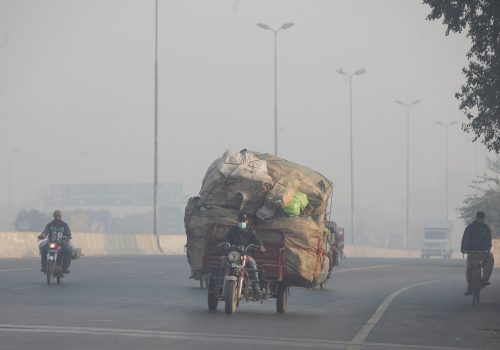January 15, 2022
Tehreek-e-Labbaik Pakistan: An emerging right-wing threat to Pakistan’s democracy
Videos circulating on Twitter, Facebook, and other social media platforms showed a violent mob dragging a half-dead man on the streets of Sialkot, Pakistan on December 1, 2021. Young men were throwing stones at him and kicking his body as he was dragged mercilessly by those who called themselves the “protectors” of the sanctity of the Prophethood.
The videos go on to show ghastly scenes of the mob burning a corpse as dozens of men not only look on, but use their cell phones to take selfies and memorialize their role in a lynching that enraged and shocked Pakistanis, Sri Lankans, and the broader global community.
The victim’s name was Priyantha Kumara Diyawadana, a 48-year-old manager at a factory in Sialkot. His alleged crime: desecrating posters featuring the name of the Prophet Muhammad.
On the surface, this lynching may seem like an isolated, extremist reaction to what allegedly happened inside a factory, and while officials have not so far named any organized group for instigating the mob, the slogans chanted at the crime scene point the finger at a sectarian politico-religious party: Tehreek-e-Labbaik Pakistan, better known as the TLP.
Belonging to the Sufi Barelvi school of thought, the TLP calls itself the defender of the Prophet Muhammad’s honor and demands severe punishment for those who do not believe in the Prophet’s sanctity and finality. While the group has distanced itself from the lynching of Kumara and even condemned it, their slogan “Man Sabba Nabbiyan Faq Tulu” (translation: kill the blasphemers of the Prophet) is evidence, according to experts in the country, that the group’s incendiary rhetoric and growing ideological influence is what inspired the mob that led to the lynching of Priyantha Kumara Diyawadana.
The group’s influence is not limited to just Pakistan. In September 2020, a 26-year-old man injured two men with a knife in Paris near the former offices of the French magazine Charlie Hebdo. This is the same magazine that published (and continues to publish) satirical cartoons of the Prophet Muhammad considered blasphemous by many Muslims across the world. In the past, these led up to the well-known 2015 massacre at Charlie Hebdo’s headquarters. This time around, however, the 2020 attacker Zaheer Hassan Mehmood told investigators that he watched videos of Pakistani preacher Khadim Hussain Rizvi – the founder of the TLP – on YouTube and TikTok weeks before the attack. The group’s adherents have also protested outside Pakistan’s embassy in the United Kingdom and its followers have deployed savvy social media skills to disseminate the ideology within and outside Pakistan.
For decades, the phrase Islamic extremism was only used while describing the Deobandi and Salafist militant groups in the world, including in Pakistan. The TLP, a new entrant in a crowded market of religious radicalism, is changing this and forcing the world to pay attention. In a short span of five years, the TLP has forced two elected governments in Pakistan to accept the legitimacy of its ideology, pushed mainstream political parties to adopt some of its slogans, and created foreign policy challenges for a nuclear-armed nation that is seeking to make a geoeconomics pivot to attract foreign investment, expertise, and trade.
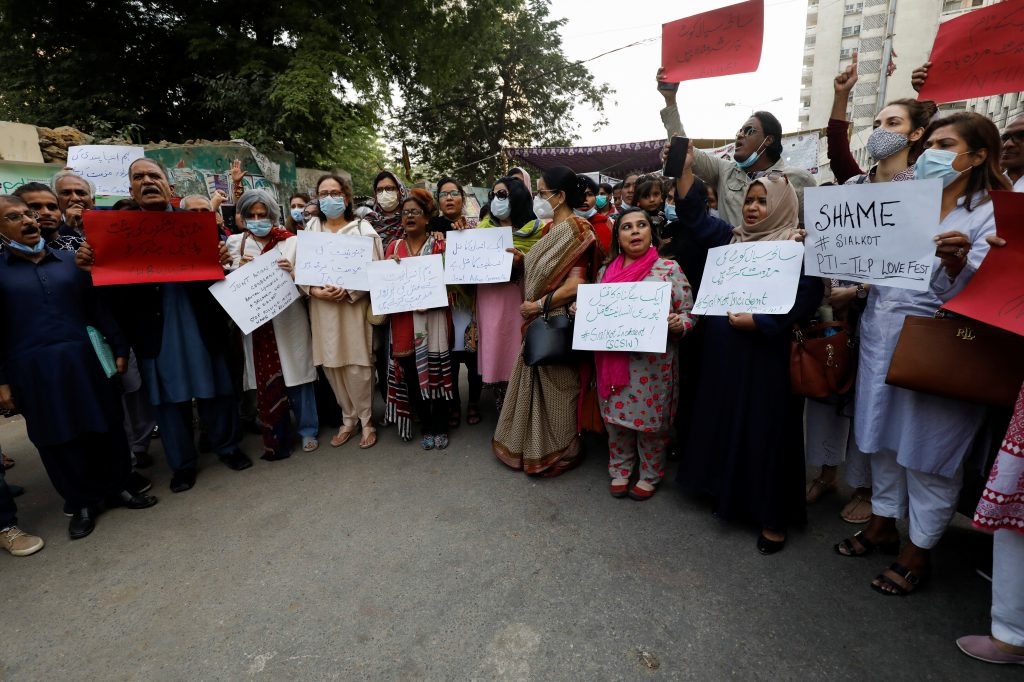
So far, the country’s civilian and military leaders have struggled to develop a cohesive strategy to deal with the TLP and the ideology it represents.
The TLP’s growing influence across Pakistan, particularly in the heartland of Punjab, poses a major challenge to Pakistan’s democracy. So far, the country’s civilian and military leaders have struggled to develop a cohesive strategy to deal with the TLP and the ideology it represents. As the 2023 general elections draw near, the threat posed by this group will continue to grow, creating domestic and foreign policy challenges for Pakistan.
Sense of deprivation among Barelvis
Karachi, a city of over 20 million and the capital of Pakistan’s Sindh province, was in many ways ground zero for a resurgent Barelvi ideology. Growing up in the early 1990s and 2000s, I saw Barelvi family and friends vociferously complain about the state’s patronage of Deobandi religious organizations. As detailed by Dr. Kamran Bokhari in a recent essay, the schism between Barelvi and Deobandi Islam dates back centuries, with the latter being able to dramatically increase its political and ideological influence in Pakistan over the last few decades. While Barelvi organizations such as the Sunni Tehreek and Jamiat Ulema-e-Pakistan existed, they were unable to compete on the political battlefield and were mostly fringe actors in Pakistan’s political economy. Though the Deobandi and Barelvi sects both originated in India, they are very different from each other. While the Deobandis follow a puritanical interpretation of Islam, the Barelvis practice what could be seen as a more traditional South Asian faith, one that is centered on the practices of Sufi mysticism.
A core grievance of Barelvi groups was with Pakistan’s former dictator Zia ul-Haq, who had given too much power to Deobandi and Salafist groups as they were important allies in the Afghan jihad against the Soviet Union. Pakistan-based Deobandi groups received overt and covert international patronage during this era, which led to a vast expansion of their grassroots networks across the country.
Once the Soviets withdrew from Afghanistan, though, the fighters – fed a healthy diet of global jihadist ideology which considered other Muslim sects heretical – turned their guns towards these other sects in Pakistan, including the Barelvis and Shiites. Several deadly bomb attacks targeting Sufi shrines and targeted assassinations became the norm and in a 2006 bombing attack, around 50 people, including the top leaders of Barelvi groups, were killed in an event organized to celebrate the birthday of the Prophet Muhammad in Karachi.
As TV channels began to report the casualties, angry Barelvis took to the streets, burning vehicles and blocking roads across Karachi. Many accused Deobandi jihadists for carrying out the attack and their accusations became a reality after Pakistani authorities pointed fingers at Lashkar-e-Jhangvi, a terrorist group that associates itself with the slain Deobandi preacher Haq Nawaz Jhangvi.
While there may be several reasons behind the 2006 bombing, a key issue was the fact that Barelvi groups by and large were opposed to jihadist ideology that had unleashed a wave of unprecedented violence across Pakistan. These Barelvi groups were seen as candidates to balance against radical jihadism, and for this reason western countries led by the United States viewed them as potential allies. In 2009, the United States provided $36,607 to the Sunni Ittehad Council, a coalition of several Barelvi groups, to hold anti-Taliban rallies across Pakistan and promote a softer image of Islam. Little did they know at the time that this ideology, fueled in part by growing Islamophobia in the West, would become powerful enough to bring life in the world’s only nuclear-armed Muslim country to a halt on several occasions, try to dictate the country’s foreign policy, and empower a new generation of radicals willing to lynch and kill anyone who disagreed with their worldview.
The arrival of the TLP
In January 2011, Salman Taseer, governor of Pakistan’s Punjab province, was assassinated by his own police guard. His alleged crime was defending Asia Bibi, a Christian woman accused of committing blasphemy, as well his public opposition to Pakistan’s blasphemy laws.
Growing Barelvism in Punjab centered on absolute respect and reverence of the Prophet as dictated by its ideology. Salman Taseer, by defending Asia Bibi and arguing against blasphemy laws, had crossed a red line and – in the eyes of Barelvi ideology – deserved to be killed.
Mumtaz Qadri, the police guard, was arrested and put on trial. While he was awarded a death sentence by an anti-terrorism court in October 2011, he became a cult hero for Barelvis, including lawyers sworn to uphold the country’s laws. An army of lawyers volunteered to represent the murderer in court, and at one time there were over 90 lawyers in the courtroom to defend him. While the appeals process moved on, several Barelvi groups took to the streets in an attempt to force the authorities to suspend Qadri’s death sentence.
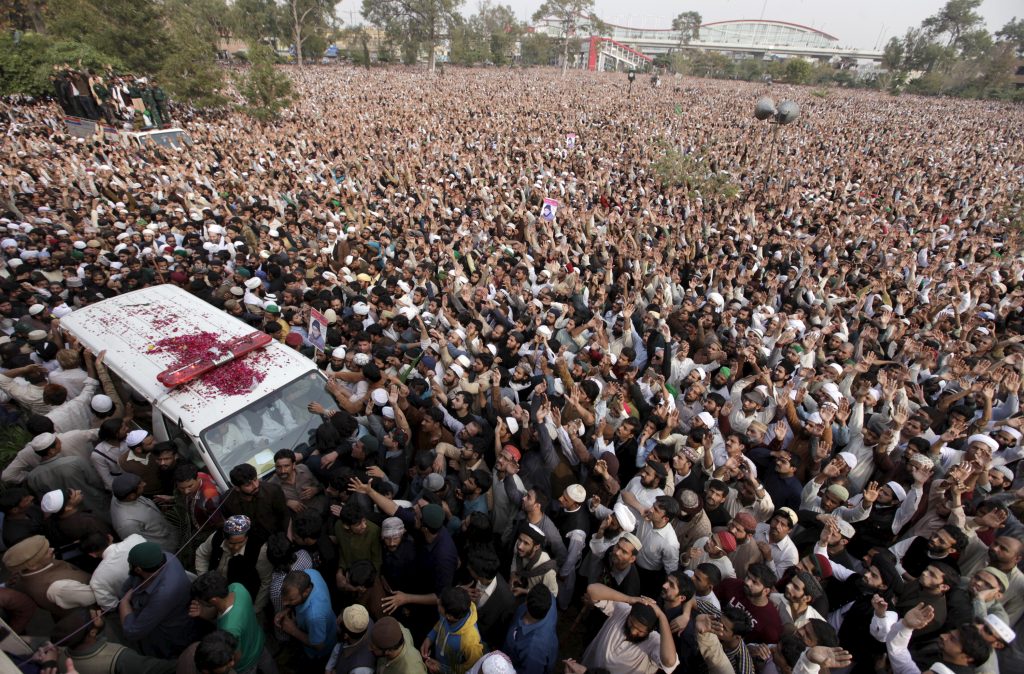
Hundreds of thousands turned to Liaquat Bagh to bid farewell to Qadri and many covering the event argued that this was one of the largest funeral processions the country ever witnessed.
Nawaz Sharif was prime minister at the time and despite the fact that a significant group of his voter base in Punjab was Barelvi, his government stood its ground and Qadri was hanged in February 2016. His funeral prayers were offered in Rawalpindi’s Liaquat Bagh, where only nine years prior former prime minister Benazir Bhutto was assassinated. Hundreds of thousands turned to Liaquat Bagh to bid farewell to Qadri and many covering the event argued that this was one of the largest funeral processions the country ever witnessed.
Qadri’s followers eventually raised enough funds to build a shrine for him in Bhara Kahu, a small town in the outskirts of Islamabad. Today, Barelvis across the country visit his shrine to pay their respects to a man they consider to be a martyr.
Qadri’s hanging was an inflection point for the emerging Barelvi movement in Pakistan. My conversations with Barelvi activists and leaders over the years revealed that the group decided to enter mainstream politics after Qadri’s hanging – they were motivated by a desire to politically damage Sharif’s PML-N government because of his decision. Qadri’s funeral prayers were arranged by the Tehreek-e-Labbaik Ya Rasool Allah (TLYR), a coalition of four Barelvi groups – Tehreek-e-Sirat-e-Mustaqeem led by Ashraf Asif Jalali, Aalami Tanzeem Ahl-e-Sunnat led by Pir Afzal Qadri, Sunni Tehreek headed by Sarwat Ejaz Qadri, and Anjuman-e-Fidayan-e-Khatam-e-Nabuwwat led by Allama Khadim Hussain Rizvi. The TLYR, however, could not remain united and Ashraf Asif Jalali parted ways with it after developing differences with other leaders.
The TLP was subsequently formed and led by Allama Khadim Hussain Rizvi. It portrayed itself as the protector of the sanctity of the Prophethood and leveraged its grassroots network of mosques to organize. Within months, the organization, fueled by Rizvi’s fiery speeches, became a major street force in Punjab and in Barelvi-dominated middle- and lower-middle urban centers in Sindh. Barelvi businessmen in Karachi along with wealthy clerics across the country became a source of funding, propelling the TLP’s dramatic rise into one of the country’s most powerful politico-religious groups.
The TLP shows off its street power
In November 2017, thousands of protesters led by Allama Khadim Hussain Rizvi – an Attock-born Lahore-based cleric – blocked the route to Pakistan’s capital city of Islamabad. They were protesting a proposed change in the oath related to the finality of the Prophethood that political candidates in Pakistan take before contesting elections to enter Parliament. The protests lasted for 21 days, with Islamabad residents unable to leave the city as protesters and law enforcement personnel continued to skirmish on the streets.
The Pakistan Army, which has fought several battles against the Pakistani Taliban, al-Qaeda, and other militant groups, was not eager to enter the foray. It suggested that Sharif’s government peacefully handle the sit-in to avoid violence because “it is not in [the] national interest.”
The sit-in ended after the military itself brokered peace between the protesters and Sharif’s government. The prime minister also had to let go of his law minister Zahid Hamid on the demand of the protesters. Lieutenant General Faiz Hameed, the former head of Pakistan’s Inter-Services Intelligence (ISI) and the director general of the ISI’s counter-intelligence wing at the time, signed the agreement between the government and the TLP as a mediator.
As the protesters began to disperse after the agreement, a video went viral on social media showing a senior military official distributing Rs1,000 each to the protesters so they could go back to their home cities. While the TLP had been unable to topple Sharif’s government, it had dealt him a blow that significantly weakened the prime minister’s grip on power and indicated that the TLP would now be a force to be reckoned with, especially if the country’s powerful establishment wanted to use it for its own agenda.
These developments further threatened the PML-N-led civilian government, however, which already had a tense relationship with Pakistan’s armed forces. Sharif and the military had been involved in an unannounced cold war soon after Sharif became prime minister in 2013 and announced that Pervez Musharraf – the former military general and dictator who suspended the country’s constitution and toppled Sharif’s government in 1999 – would be tried for high treason.
The rifts between the elected government and the military became even more visible after Pakistan’s Dawn newspaper published a front-page news story claiming that the civilian government told the military that it had to act against all militant groups and that a policy of allegedly protecting some armed militants was risking international isolation. This story, popularly known as Dawn Leaks in Pakistan, created a schism between the PML-N and the security establishment that continues to plague Pakistani politics to this day.
For the PML-N and its leaders, the rise of the TLP and their days-long protest in Islamabad, coupled with the viral videos of men in uniform paying off the protestors, was evidence that this group was being supported by the establishment as part of a broader effort to prevent the PML-N from regaining power in the 2018 elections, an allegation that both the military and the TLP deny.
Soon after the 2018 election, I explicitly asked TLP leader Khadim Hussain Rizvi if the army supported him to weaken Sharif’s party. The fiery orator from Punjab smiled a little before reciting a Persian poem of Allama Iqbal – who is called the “poet of the east” by Pakistanis – and said that while some people may have taken advantage of the protests, he as leader of the TLP had never sought anyone’s support.
Pakistan’s Supreme Court had also taken notice of the TLP’s rise and wrote in a judgment that the TLP gained strength during the 2017 protests because it received unabated media coverage and support from some political leaders. The judges also pointed the finger at the ISI’s alleged role in the country’s politics. The verdict said, “the perception that ISI may be involved in or interferes with matters with which an intelligence agency should not be concerned with, including politics, therefore was not put to rest.”
The TLP tasted blood during the 2017 protests and quickly realized that its ability to lock down Islamabad was a key asset. In the coming years, the group would leverage growing Islamophobia and anti-Islam radicalism in the West – and Europe in particular – to fuel its own radical ideology and showcase an ability to outflank Pakistan’s political and military leadership.
Protests against a cartoon contest in the Netherlands and Asia Bibi’s acquittal
In 2018, Islamophobic Dutch lawmaker Geert Wilders planned a blasphemous caricatures contest in the Netherlands that enraged Muslims across the world. Physical depictions of the Prophet are forbidden in Islam and are deeply offensive to Muslim. Pakistanis were enraged and Prime Minister Imran Khan’s government, which had risen to power after the 2018 elections, recorded its strong protest with Dutch authorities.
Khadim Hussain Rizvi, the wheelchair-bound TLP leader, once again instructed his workers and sympathizers to take to the streets in an attempt to force Khan’s government to sever diplomatic ties with the Netherlands. After successfully influencing domestic politics in 2017, the TLP was now beginning to exert influence on Pakistan’s foreign policy. The rally was canceled after Wilders himself announced that he won’t be holding any such contest. He said that the decision was made to “avoid the risk of victims of Islamic violence.” The TLP described the cancellation of the contest in front of its supporters as the group’s victory while the Khan government breathed a sigh of relief.
But this was only the calm before the storm. Violence gripped Pakistan in October 2018 after the Supreme Court acquitted Asia Bibi, a Christian woman who was sentenced to death in 2010 for blasphemy and for whose defense Punjab governor Salman Taseer was assassinated. TLP protesters held sit-ins across the country and brought various parts of the country to a standstill.
Prime Minister Khan’s government followed a now tried-and-tested playbook of negotiating with the group. Violent protests ended after his government assured the TLP that it will not bar the protesters from legally challenging Bibi’s acquittal. The appeal was rejected, however, by Pakistan’s Supreme Court. Bibi was then released and promptly left the country with her family to seek asylum abroad.
The TLP’s growing street power was fueled by its successes in the 2018 general elections, where the group emerged as the fourth largest political party in Pakistan, securing almost 2.2 million votes. While the party could not win any seats in parliament, it did secure enough votes in Karachi to send two of its members to Sindh’s provincial assembly. In tightly contested seats in Punjab, the group managed to play the role of spoiler and undermined the PML-N’s chances of winning more seats in the national assembly. Out of 2.2 million total votes received, the TLP received over 1.9 million votes in former prime minister Sharif’s home province, according to the data obtained by the Election Commission of Pakistan.
Analysis suggested that the TLP had played its part in delivering defeat to Sharif’s party in at least 13 national assembly seats. In short, the PML-N may have easily won these seats if Barelvi voters, which had historically been part of the PML-N’s vote bank, had not changed their loyalty to the TLP.
The outcome was not a surprise for those who had followed the TLP’s election campaign. Khadim Hussain Rizvi had consistently portrayed his party as the protector of the sanctity of the Prophethood. He also accused Sharif’s party of making legal changes to the oaths parliamentary candidates took with regards to their belief in the finality of the Prophethood. This, coupled with Sharif’s decision to hang Mumtaz Qadri, meant that the newly energized Barelvi voter base was unlikely to remain allied to the PML-N.
Anti-France protests
In November 2020, TLP leader Khadim Hussain Rizvi once again attempted to lead his supporters towards Islamabad. This time, the agenda was to push Khan’s government to sever diplomatic ties with the French government after a magazine in Paris published blasphemous caricatures of the Prophet Muhammad. The anger among radical Barelvis in Pakistan grew further after French President Emmanuel Macron vowed not to “give up cartoons” depicting the Prophet following the beheading of a history teacher who had shown blasphemous sketches in his class.
The road to Islamabad became a battlefield and several policemen and protestors were injured in clashes in Rawalpindi after law enforcement personnel attempted to bar the group from reaching Islamabad. But this use of force further enraged the protestors and the government ultimately backtracked, reverting once more to its old playbook of negotiating with the TLP and signing an agreement. This time, it was government ministers who signed on the dotted line. A radical group had now secured guarantees that the government will table a resolution in parliament to discuss the expulsion of the French ambassador from Pakistan. The agreement further said that Khan’s government will not post an ambassador to France and that all French products will be boycotted in the country.
While TLP leaders went back home after the November 17 agreement, the group’s power show was far from being over. Just two days after the end of the anti-France rally, a source in Lahore informed me that Khadim Hussain Rizvi had passed away. I managed to get a hold of his son Saad Hussain Rizvi over the phone. Khadim Hussain Rizvi, the fire-breathing leader of the TLP who had inspired a new generation of radicals in Pakistan, was dead.
Hundreds of thousands attended Rizvi’s funeral at the historical Minar-e-Pakistan in Lahore – where the Pakistan Resolution was signed in 1940 – and Pakistan’s civilian and military leadership, including Prime Minister Khan and Chief of Army Staff (COAS) General Qamar Javed Bajwa, issued messages of condolence on his passing.
The question now was this: who would be the next leader of the TLP?
We had an answer just a few hours later. Khadim Rizvi’s 26-year-old son, a man I believed did not have the charisma to fill his father’s shoes, was now going to be the TLP’s leader as head of the party’s 18-member shura (council).
Sabookh Syed, a journalist who had also covered the militant groups, believed that Saad would struggle because his father Khadim Hussian Rizvi had “a charismatic personality and an aggressive unique style of delivering sermons that made him the center of attraction.” Without these skills, many believed that the TLP may lose its ability to sustain the attention of its millions of followers and become less of a problem for Pakistan’s political and military elites.
Saad Rizvi, however, would quickly prove me and others like Syed wrong.
The last laugh
In April 2021, the TLP, now under its new leader, planned another round of anti-France protests, claiming that Khan’s government had not kept its promise of expelling the French ambassador.
As a pre-emptive measure, the government arrested Saad Rizvi, hoping that the arrest would undermine the group’s ability to organize the protests. The government’s calculus was also shaped by the risks of a diplomatic crisis with France: The country could end up losing support from the European Union, leading to withdrawal of preferential trade access and significant financial losses for an already wavering economy.
As news of Saad Rizvi’s arrest hit television channels, TLP supporters began to gather on roads across the country. The government decided to not yield to the TLP and swifly moved to ban it under the country’s anti-terrorism laws, also detaining its leaders. But this only further enraged the TLP’s supporters, who decided to bide their time before testing the government’s commitment.
On October 22, thousands of TLP protesters started marching towards Islamabad in another attempt to force the government to sever diplomatic ties with the French government. The TLP argued that the government had failed to expel the French ambassador from Pakistan and follow through on its previous agreements. While the government tried to engage the groups in talks, no breakthrough was achieved. The police were initially ordered to prevent the protestors from reaching Islamabad, leading to the death of several people, including policemen, in violent clashes on the streets of Punjab.
In Islamabad, several sources inside the government revealed that the prime minister was in no mood to give concessions to the TLP because he believed the group was both damaging Pakistan’s and Islam’s image across the world through its violent ideology.
On October 29, Khan convened the meeting of his National Security Committee, which was attended by civilian and military leaders, including COAS General Bajwa and ISI chief General Faiz. The decision was clear: Pakistan will no longer allow the TLP to challenge the writ of the state.
Khan’s cabinet ministers were also critical of the TLP. Fawad Chaudhry, the country’s information minister, called the TLP a militant organization and said that the Pakistani state will treat the group the same way as it had treated Tehreek-e-Taliban Pakistan (the Pakistani Taliban, also known as the TTP) or Osama bin Laden’s al-Qaeda.
But as the rest of the country soon found out, the government’s sharp words rang hollow as sources indicated that the TLP’s leader Saad Hussain Rizvi had been secretly taken from Lahore to hold talks with the government in Islamabad, where Rizvi was hosted at a government rest house. Islamabad’s rhetoric soon began to shift, with ministers confirming that they were talking to the group with an aim to end the rally before it could reach the capital. Several hours of conversation between TLP leaders and government ministers followed and reports began to indicate that yet another agreement had been reached with the TLP.
Intervention by COAS General Bajwa had made this success possible. General Bajwa had met with Mufti Muneeb-ur-Rehman and Maulana Bashir Farooqi, two powerful and respected clerics among Barelvis in Karachi. The two men spoke to the army chief about the crisis and later confirmed that General Bajwa played an important role in ending the deadlock. The military has neither admitted nor denied its role in talks between the TLP and the government.
Just a day after the unreported meeting, Mufti Muneeb, TLP leaders, and the minister appeared before the media in Islamabad on October 31 and announced that the two sides had reached a secret agreement. Following this secret agreement, Pakistan revoked the ban imposed on the TLP and released the group’s leader Saad Hussain Rizvi from jail in November 2021.
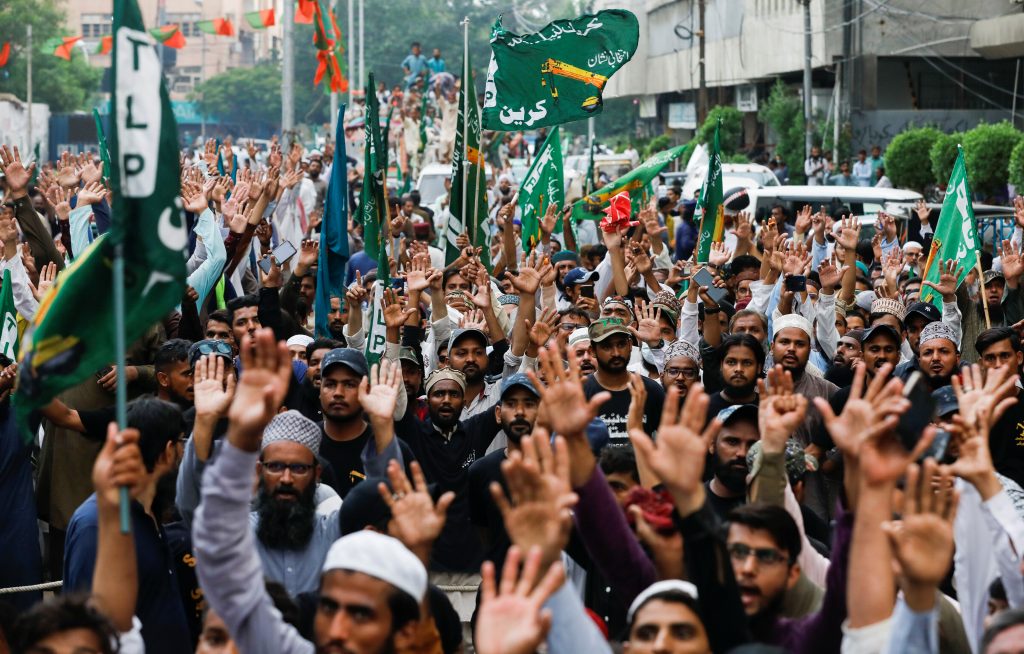
The 2023 general elections will be hotly contested and no major political party can afford to confront the TLP and its millions of voters.
This means that the TLP is once again free to contest elections without any restrictions and is likely to emerge as a powerbroker in the coming general elections. Like previous governments, the Khan government has also decided to not further enrage the group and its followers. This decision is largely driven by electoral interests. The 2023 general elections will be hotly contested and no major political party can afford to confront the TLP and its millions of voters.
Conclusion
The TLP has resumed political activities and its young leader, it seems, has already started preparations for the next elections in 2023. At a public gathering in Lahore last month, Saad Rizvi asked his supporters to vote for his party in the 2023 elections. He termed the removal of the ban and his release as evidence of the group’s success and exclaimed that “ballot boxes should not remain empty during the next elections.”
Saad Rizvi no longer sounds like an inexperienced leader. His group’s ability to coerce the government into unbanning the TLP and release him from prison has created tailwinds for this radical movement. Saad has now become a key political stakeholder in the country who is coveted not only by his supporters but also by the leaders of other political parties, including the secular-minded Pakistan Peoples Party (PPP). Khan’s Pakistan Tehreek-e-Insaf (PTI) has already indicated that his party is discussing an alliance with the TLP in the next general elections. Ejaz Chaudhry, a PTI senator, was the first to meet Saad Hussain Rizvi. Other PTI leaders, however, have denied making any decision to align the PTI with the TLP.
Khan’s recent moves suggest that he also wants to keep the country’s right wing happy. Recently, he formed a “Rehmatul lil Aalameen Authority” with an aim to religiously reform Pakistani society. The prime minister wants religious clerics to introduce religious reforms so the new generation of Pakistanis can see what their religion actually says. His government has already started working with a Turkish broadcaster to make dramas on Muslim figures whom he calls “heroes” and has organized conversations with global Islamic scholars to talk about a range of topics including corruption and growing sex crimes.
These developments highlight that while mainstream political parties in Pakistan frequently talk about the need to de-radicalize society, especially in conversations with Western interlocutors, they often seek to co-opt radical groups and their supporters when it is time to win votes.
In a recent by-election for a national assembly seat in Lahore, the liberal PPP, which is led by former prime minister Benazir Bhutto’s son Bilawal Bhutto Zardari, hung banners across the constituency carrying the picture of the party founder Zulfikar Ali Bhutto. The message on the banners read “Labbiak Ya Rasool Allah,” with pictures of the PPP founder portraying him as “Mujahid Khatam-e-Nabuwaat” (Mujahid of finality of Prophethood), pointing to his government’s decision to pass laws that barred Ahmadis from calling themselves Muslims in Pakistan.
The group’s ideology may also pose a challenge for Pakistan’s military, mainly because the TLP is growing in influence in regions that provide a significant number of new recruits. The growing influence of radical Barelvi ideology could create long-term institutional challenges for Pakistan’s armed forces, leading to a growing ideological divide between an increasingly conservative lower cadre and senior commanders with a different ideological leaning. Such an outcome, while highly unlikely, could have far-reaching consequences.
While the TLP has leveraged its street power to coerce successive governments, it is unlikely that the group will win a large number of seats to Pakistan’s national assembly in the 2023 elections. However, it will definitely play the role of a spoiler in hotly contested seats across Punjab. This spoiler role may force mainstream political parties, the PML-N and PTI in particular, to pursue an electoral alliance with the TLP in 2023. Such an alliance would significantly increase the TLP’s political power and leverage in forming the next government in Pakistan.
Elections are still over a year away, meaning that it is difficult to predict how things will shape up. But if history is any guide, then it is likely that overt or covert alliances with the TLP may emerge in the coming months. The TLP’s weaknesses or strengths will be tested in the 2023 general elections, but one thing is for certain: the TLP has rekindled Barelvi political Islam, radicalized a new generation of Pakistanis, and pushed mainstream parties to co-opt right-wing slogans to win over conservative religious voters.
The most ominous outcome of the TLP’s rise is that the role of religion in shaping the state’s affairs and influencing society has only grown. Mainstream political and non-political actors are at a loss when it comes to credibly countering this ideology. The TLP’s ideology has found its home in Punjab and has weaponized a highly emotional religious issue. This makes it extremely difficult for state institutions to push back against the group, especially given the growing class and ideological divide in the country. For now, the state has found it easier to accept the group and find ways to co-opt and mainstream it. But as the TLP’s influence grows and its ideology spreads, the de-radicalization of Pakistani society looks like an even more distant dream.
Roohan Ahmed is an independent journalist based in Islamabad covering politics and extremist groups in the region.

The South Asia Center (SAC) is the hub for the Atlantic Council’s analysis of the political, social, geographical, and cultural diversity of the region.
At the intersection of South Asia and its geopolitics, SAC cultivates dialogue to shape policy and forge ties between the region and the global community.
Related content
Image: Supporters of the religious and political party Tehreek-e-Labaik Pakistan (TLP) wave as they chant slogans against the satirical French weekly newspaper Charlie Hebdo, which reprinted a cartoon of the Prophet Mohammad, during a protest in Karachi, Pakistan September 4, 2020. REUTERS/Akhtar Soomro
